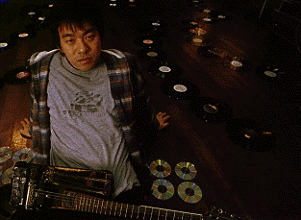[
homepage
|
subscribe
|
feedback
|
guestbook
|
contents
|
post
]
architecture
¥
art
¥
film
¥
food
¥
nitelife
¥
performing arts
¥
style
Otomo wields an electric guitar as if it were a chainsaw, but
he can also make accessible, "conventional" music that is emotionally powerful,
mesmerizingly simple and beautiful.

Every city has its soundtrack; Tokyo's might be one of talking
teller-machines, incessant advertising, the platform music of the Yamanote
Line, stock-market reports, trite pop songs and immense audio-visual
billboards. Yoshihide Otomo records sounds like this and organizes them into a
bristling, kaleidoscopic vision of our world.
But there is more to Otomo than sonic documentary and musique-concrete
collage. The past year has seen this prolific musician (over 100 shows in
1995, more than half of them in Europe, the former U.S.S.R. and the U.S.)
branching into increasingly diverse collaborations and releasing three
groundbreaking albums.
Otomo's music is not, in general, easy-listening. Drawing upon a range of
instruments that most musicians would discount as mere tools--turntables,
samplers, Mini Disk players and DAT machines--he veers from sounds that are
tranquil and reassuring to noises that are ominous and abrasive. Listening to
an Otomo album is to be drawn into a semi-conscious debate about the act of
listening itself--and what we sometimes blindly accept as "music"; a point that
two of his 1995 releases, Tatakiuri (with British violinist Jon Rose)
and the powerful Revolutionary Pekinese Opera (with his own ensemble,
Ground Zero) drive home with sometimes overwhelming force.
While Otomo can wield an electric guitar as if it were a chainsaw, wrenching
from it howls of feedback and manic, wall-of-sound squiggles, his abilities are
firmly grounded. He has proved himself capable of making accessible,
"conventional" music that is emotionally powerful, mesmerizingly simple and
beautiful. Take the soundtrack he composed for the Chinese film The Blue
Kite (winner, Grand Prix, 1993 Tokyo International Film Festival) for
example--or the music he was invited to create as a result of that commission:
the lushly orchestrated score for Hong Kong filmmaker Yim Ho's feature, The
Day the Sun Turned Cold (winner, Grand Prix, 1994 Tokyo International Film
Festival).
Otomo has also been extremely active in establishing contact with other Asian
musicians and is well-known for his critical appraisal of the Japanese music
industry. But perhaps the best way for us to explain our choice of Otomo this
year is to paraphrase his words as an expression of our ongoing dedication to
artists of his kind: "This is not the end result of an assignment," he wrote in
his liner notes to The Blue Kite. "It is the start of a new
commitment."
architecture
¥
art
¥
film
¥
food
¥
nitelife
¥
performing arts
¥
style
[
homepage
|
subscribe
|
feedback
|
guestbook
|
contents
|
post
]
Copyright © Tokyo Journal
